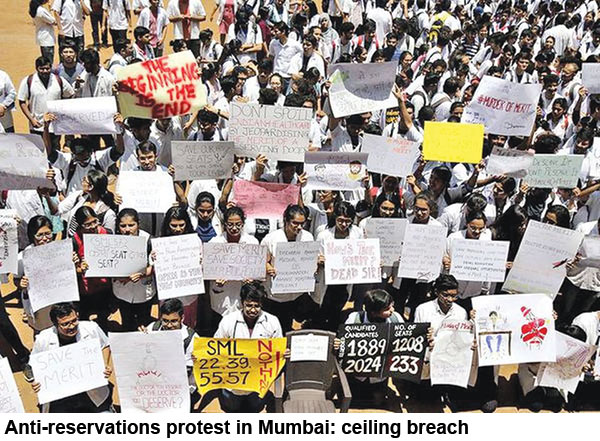 Introduced in the constitution of India (1950) as affirmative action by the State in favour of specific historically oppressed castes and tribes persecuted and ostracised for several millennia under the Hindu varna caste system, reservation of seats in higher education institutions and government employment is being demanded — and conceded — by populist politicians to almost every caste and community with real or imaginary histories of oppression and persecution.
Introduced in the constitution of India (1950) as affirmative action by the State in favour of specific historically oppressed castes and tribes persecuted and ostracised for several millennia under the Hindu varna caste system, reservation of seats in higher education institutions and government employment is being demanded — and conceded — by populist politicians to almost every caste and community with real or imaginary histories of oppression and persecution.
In recent months, Maharashtra — India’s most industrialised state — has witnessed a spate of agitations and protest hunger strikes against “excessive” reserved quotas being conceded by the state’s ruling BJP/Shiv Sena government. In August, after 13 protest meetings were staged in Mumbai, Solapur and Nagpur, the Maharashtra government announced (August 21) a panel to review reservations and recommend ways and means to create additional capacity for non-quota (merit) students.
Until late last year, reserved quotas in government colleges and higher ed institutions were capped at 52 percent. But on November 29, the state government announced a 16 percent quota for Maharashtra’s socially and educationally backward caste (SEBC) Maratha community. Moreover, on January 9 this year, the BJP/NDA government at the Centre proclaimed 10 percent reservation for economically weaker section (EWS)students of non-backward, i.e, upper castes. Although on June 27, the Bombay high court reduced the SEBC Maratha community’s quota to 12 percent, at 74 percent, the state’s overall reservations are way beyond the ceiling of 50 percent mandated by the Supreme Court in its landmark verdict in Indira Sawhey & Ors vs. Union of India (1992).
Aspirational middle class school-leavers who top the state government’s annual Common Entrance Exam (CET) which determines entry into institutions of professional education (engineering, medicine), are hardest hit by reserved quotas. The worst hit are merit students aspiring for highly subsidised medical education in the mere 14 government medical colleges in Maharashtra (pop.114 million).
For the academic year 2019-20, only 875 seats in government medical colleges were allotted to students from unreserved castes and communities, out of a total of 4,080. In the posgraduate courses only 170 (of 1,700) seats were allocated for meritorious students who don’t qualify for caste and community quotas. In this connection it’s pertinent to note that 4.13 million school-leavers wrote the Maharashtra CET in May this year.
Although Maharashtra also hosts 36 private medical colleges, bagging a seat in a government medical college is a matter of vital importance to millions of youth aspiring for medical practitioner qualifications. Tuition fees in government medical colleges are heavily subsidised. For instance, the tuition fee payable by undergraduate and graduate students in Maharashtra’s 14 government medical colleges is Rs.75,000-95,000 per annum cf. Rs.6-14 lakh per year in private medical colleges.
Unsurprisingly, parents of students with high scores in MCET, who are shut out of government medical colleges because they don’t fall within reserved categories, are up in arms against runaway quotas. Save Merit Save Nation (SMSN), a non-political movement spearheaded by parents of open-category students, was launched after quotas in the state crossed 52 percent. SMSN is now gathering support from all quarters.
Teaming up with ‘Youth For Equality’ (YFE, estd.2006) — a Delhi-based citizens group opposed to caste-based reservations — SMSN members have filed five writs in the Supreme Court challenging the constitutional validity of the Maratha reservation law and the Bombay high court’s June 27 order reducing, but upholding, the state government’s reserved quota for the Maratha community. The petitioners’ writs contend that the Maharashtra government framed the SEBC Act under “political pressure”.
Responding to widespread protests against the quota legislated for Marathas who constitute a third of the state’s population and are hardly ‘backward’, the BJP/Shiv Sena state government has constituted a seven-member committee chaired by additional chief secretary (services) to draw up a blueprint for allotting non-quota students seats proportional to the number of seats available to them before the EWS and Maratha quotas were legislated.
However, parents of non-quota students are skeptical about the report of the new committee and the populist chief minister’s assurances. “The government is gifting quotas to powerful vote banks with an eye on the state legislative assembly to be held next month (October). In the long term, this vote banks appeasement policy will lead to mediocre professionals with inadequate skills manning important posts, and endangering citizens’ lives. Our hope is that the Supreme Court will stand firm on its verdict in Indira Sawhney’s Case and cap all reservations at 50 percent. That’s more than enough to serve the cause of social justice,” says Brijesh Sutaria, a core committee member of SMSN.
Dipta Joshi (Mumbai)


























